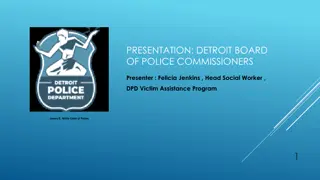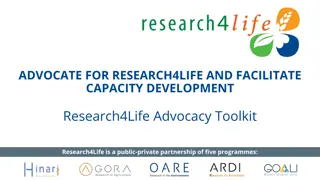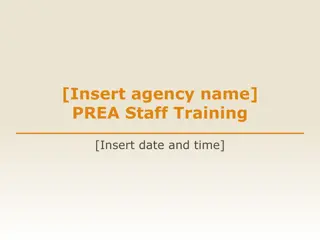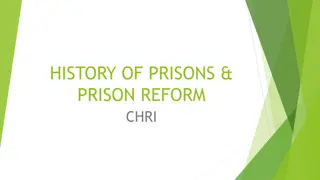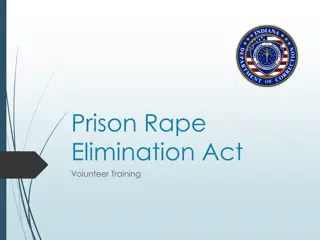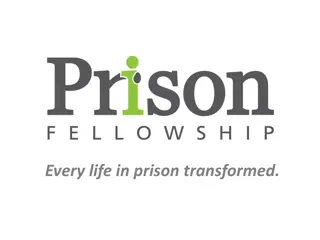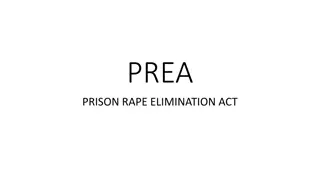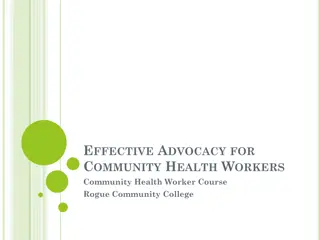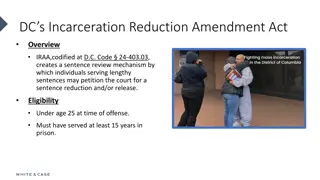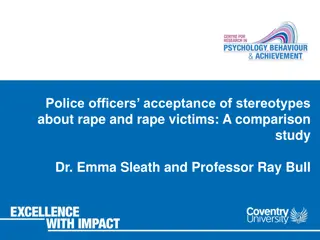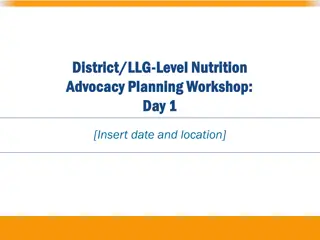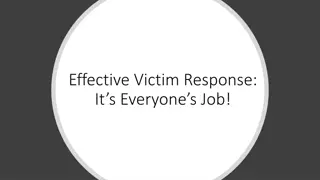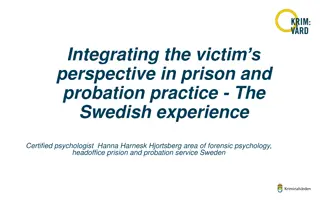Understanding the Prison Rape Elimination Act (PREA) and Victim Advocacy
The Prison Rape Elimination Act (PREA) is the first federal law addressing sexual violence in detention facilities, setting standards for prevention and response. It requires compliance from various facilities and emphasizes access to victim advocacy services, outlining the roles and boundaries of advocates. Confidentiality is a key aspect, ensuring survivors' privacy and support. Victim advocacy offers assistance to survivors, promotes their rights, and serves as a vital resource in navigating traumatic experiences.
Download Presentation

Please find below an Image/Link to download the presentation.
The content on the website is provided AS IS for your information and personal use only. It may not be sold, licensed, or shared on other websites without obtaining consent from the author. Download presentation by click this link. If you encounter any issues during the download, it is possible that the publisher has removed the file from their server.
E N D
Presentation Transcript
Prison Rape Elimination Act (PREA) & Victim Advocacy
What is PREA? The first federal law passed to address sexual violence in detention facilities (2003) PREA standards tell detention facilities what they must do to comply (2012) Requires prevention and response to sexual violence
Which Facilities? Most detention facilities are required to comply This includes: prison, jails, lockups, community confinement facilities, juvenile detention facilities, and immigration detention facilities
What Does PREA Say About Access to Victim Advocacy? Requires confidential access to external support services Timely access to crisis intervention Right to have advocate at forensic exam Right to have advocate at investigatory interviews
What is Victim Advocacy? Help for survivors of sexual assault Knowledge of survivors rights Providing information and resources In Washington State, advocates must meet training requirements
What is an Advocates Role? Listen, believe, provide support Safety planning Provide information and options Refer to other resources Keep information shared confidential Serve as liaison between survivor and system Inform survivor of their rights
What is Outside an Advocates Role? Being a survivor s friend Providing legal advice Making decisions for a survivor Telling a survivor whether to report or not Investigating a crime Providing therapy or other mental health treatment services
Confidentiality Under PREA, facilities must provide confidential access Everyone else in a facility must report sexual assault In Washington State, advocates also have privileged communication with all survivors This does not change when the survivor is incarcerated
Reporting is Different from Advocacy PREA also says that corrections facilities must provide several options for reporting sexual assault Some of those options are calling or writing to someone outside the facility This is different than advocacy, because those people are required to report back and advocates are not
This project was supported by subgrant No. F15-31103-089 awarded by the state administering office for the STOP Formula Grant Program. The opinions, findings, conclusions, and recommendations expressed in this publication/program/exhibition are those of the author(s) and do not necessarily reflect the views of the state or the U.S. Department of Justice, Office on Violence Against Women. Grant funds are administered by the Office of Crime Victims Advocacy, Community Services and Housing Division, Washington State Department of Commerce.




